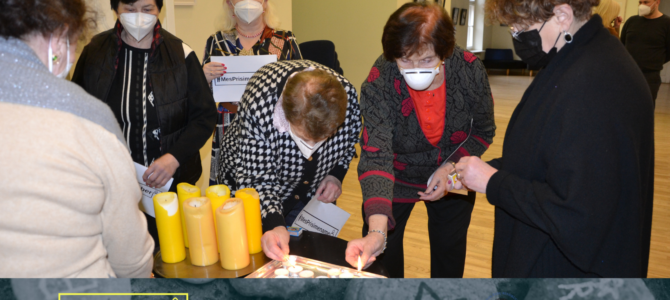

EJC Live-Streaming Event for Holocaust Day
Dear Friends,
We would like to remind you about EJC’s online International Holocaust Remembrance Day commemoration, which will be held tomorrow at 4PM CET.
The event will be available live on EJC website <http://www.eurojewcong.org>, as well as on YouTube <https://www.youtube.com/user/eurojewcong> and Facebook <https://www.facebook.com/Eurojewcong/>.
No registration is required. The event will appear live on all the above-mentioned channels shortly before the scheduled time.
Thank you in advance.
Kind regards,
Raya and the EJC team
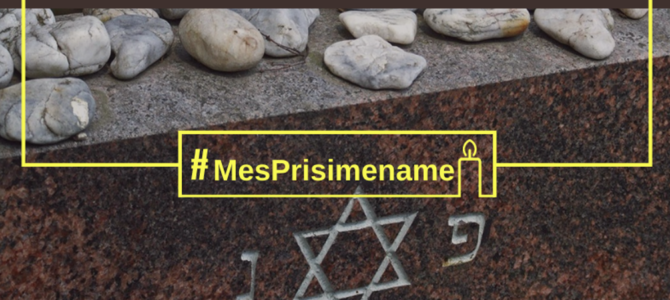
Invitation to Mark International Day of Commemoration in Memory of the Victims of the Holocaust
January 27 is International Day of Commemoration in Memory of the Victims of the Holocaust, recalling the six million Jews murdered during the Holocaust. The Lithuanian Jewish Community invites Lithuania’s educational and scientific community to join us in the campaign #WeRemember/#MesPrisimename and to remember the victims, eye-witnesses and heroes of the Holocaust who lived in the cities and towns of Lithuania.
We invite you to engage actively in International Day of Commemoration in Memory of the Victims of the Holocaust and to spread the news about the importance of this day among the various educational communities and institutions of general, higher and professional learning. Assign the activities of this day to teaching young people about the memory of Holocaust victims and organize encounters with the older members of the Jewish communities who remember and won’t let these horrific periods of history slip into oblivion. We invite you to pay special attention to remembering those who rescued Jews. Their courage set an example of humanity for future generations.
You can find educational materials, testimonies and stories told by survivors and other useful information which will help present the story of the Holocaust in an interactive and understandable way to young people on the Lithuanian Jewish Community’s webpages lzb.lt, lzb.lt/en and lzb.lt/ru, and at our virtual initiative @AtmintiesKalendorius on our facebook page.
You can also take part in the campaign by visiting the mass murder sites in your local area and by taking photos there and posting them to your social media with the hashtags #WeRemember and/or #MesPrisimename. Take a photo of yourself holding a piece of paper or a sign with the inscription #WeRemember and/or #MesPrisimename. Also, on the eve of the International Day of Commemoration in Memory of the Victims of the Holocaust, join the global campaign by adding a #WeRemember frame to your social media profile. Frames can be found at #WeRemember and/or #MesPrisimename.
#WeRemember #MesPrisimename #Neveragain #NiekadaDaugiau #HolocaustMemorialDay
Thank you,
Faina Kukliansky, chairwoman
Lithuanian Jewish Community
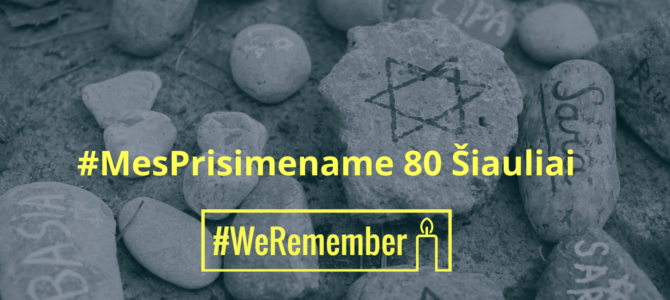
#MesPrisimename@80 in Šiauliai
The International Day of Commemoration in Memory of the Victims of the Holocaust is on January 27. It commemorates the date the Auschwitz-Birkenau concentration camp was liberated and the six million Jews murdered in the Holocaust in Europe. In Lithuanian entire Jewish communities in cities and towns were exterminated.
The Šiauliai Regional Jewish Community invites residents to come to monument marking the site of the Šiauliai ghetto at the corner of Vytauto and Žalgirio streets at 12 noon on January 27 to light candles and remember the victims of the Holocaust.
At 12:30 we’ll move to the Square of Righteous Gentiles to honor the heroes of the Lithuanian nation who rescued their Jewish fellow citizens during World War II. At 1:00 P.M. we will light candles at the site of the former second ghetto at the corner of Trakų and Ežero streets.
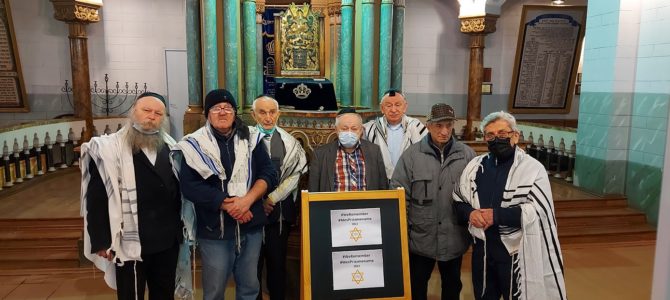
WeRemember with the Minyan at the Choral Synagogue in Vilnius
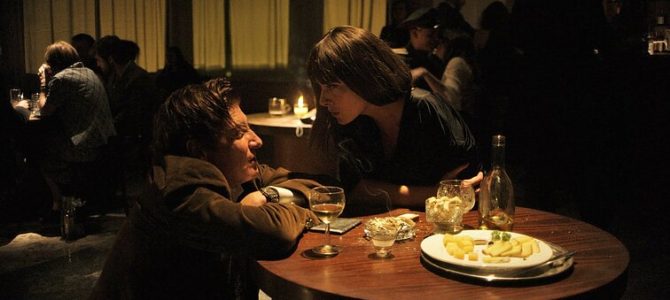
Filmmaker Emilis Vėlyvis Calls Izaokas Best Lithuanian Art Film in 30 Years
LRT.lt, August 30, 2021
Jurgis Matulevičius film debut “Izaokas” has been playing for three weeks now at Lithuanian movie theaters and has received much praise from average moviegoers and film-industry colleagues as well, according to a press release by the makers of the film.
“Although the category of art film is not my favorite, the film Izaokas is in my opinion the best work in this category over the last 30 years of Lithuanian cinema. Bearing in mind that this is the first full-length feature by the director, he should be given another medal as well for talent,” film director Emilis Vėlyvis said.
Full article in Lithuanian here.
The film tells the story of an LAF volunteer who murders a Jew named Izaokas, or Isaac, during the Lietūkis garage massacre in Kaunas in 1941 and who is haunted by the memory for years. The IMDB entry for the film says:
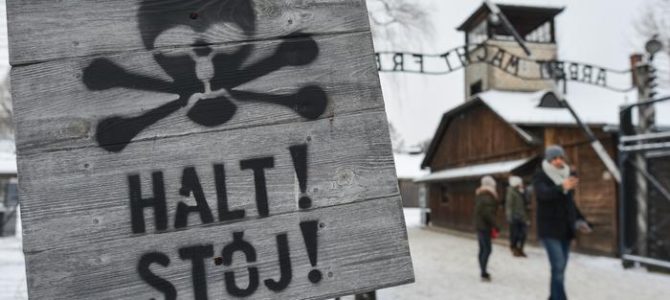
UN General Assembly Adopts German-Israeli Proposal against Holocaust Denial
Deutsche Welle
Ambassadors of Israel and Germany say denying the Holocaust threatens peaceful coexistence worldwide. Their appeal comes 80 years after the Wannsee Conference where Nazis discussed the extermination of Europe’s Jews.
The UN General Assembly on Thursday adopted a resolution proposed by Israeli and German ambassadors rejecting and condemning any denial of the Holocaust.
The 193-member assembly agreed on the proposal without a vote with only Iran distancing itself from the text. The assembly also urged social media companies to “take active measures” to fight anti-Semitism online.
“The General Assembly is sending a strong and unambiguous message against the denial or the distortion of these historical facts,” German UN ambassador Antje Leendertse said. “Ignoring historical facts increases the risk that they will be repeated.”
Full story here.
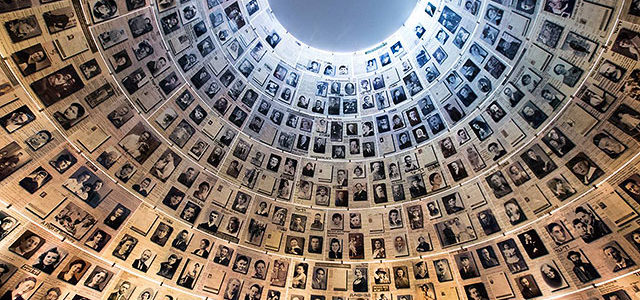
Yad Vashem Budget Increased by 29 Million Shekels
As expected, the Israeli Government approved an increase to the budget of the Yad Vahsem Holocaust Commemoration and Research Institute on Sunday, January 23, increasing the institution’s budget by 29 million shekels for 2022 to combat anti-Semitism and Holocaust denial. It was reported earlier the budget increase was needed because of flagging donations.
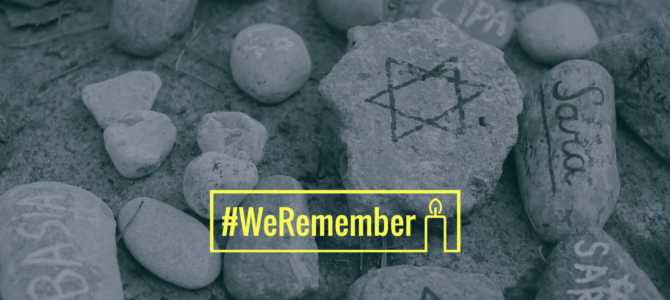
#WeRemember/#MesPrisimename 2022
On January 27 International Day of Commemoration in Memory of the Victims of the Holocaust will be marked around the world, recalling the death of six million Jews in the Holocaust.
The Lithuanian Jewish Community invites you to participate in the event and to remember the victims, eye-witnesses and rescuers who lived in Lithuania’s towns and cities.
Remembrance of the suffering Holocaust victims experienced compels us to accept shared responsibility to prevent crimes against humanity. We invite you to get involved by visiting the mass murder and mass grave sites where you live, or by sharing the hashtag #WeRemember or #MesPrisimename on your social media accounts.
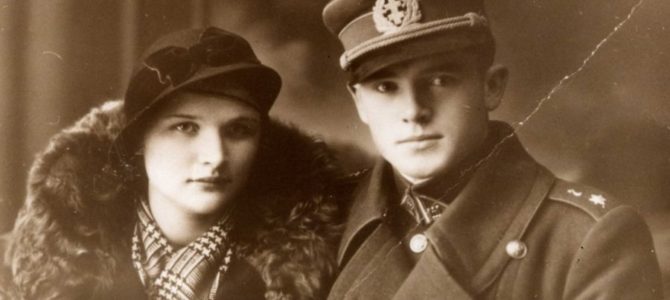
Jonas Noreika Was Holocaust Perp, Not Righteous Gentile, Granddaughter Says
Jonas Noreika: Savior or slayer of Jews?
by Silvia Foti
My maternal grandfather was declared a Rescuer of the Jews by the Lithuanian Genocide Resistance and Research Centre. This division is funded by the Lithuanian government, dedicated to establishing and enforcing the legal and official historical narrative of the nation.
The context of the pronouncement was the impending launch of my memoir The Nazi’s Granddaughter: How I Discovered My Grandfather Was a War Criminal. Reluctantly, I had come to the horrific conclusion that my grandfather, Jonas Noreika, was involved in the murder of 8,000 – 15,000 Jews in Lithuania. The book launch in March 2021 coincided with multiple lawsuits against the government of Lithuania, accusing them of Holocaust fraud; these were filed by Grant Gochin, the descendant of some of my grandfather’s victims.
Father Borevičius
A single testimony, given by the Lithuanian priest, Father Jonas Borevičius, was the well from which this decree about my grandfather was drawn. His deposition was given 40 years after the Holocaust in a court in Chicago.
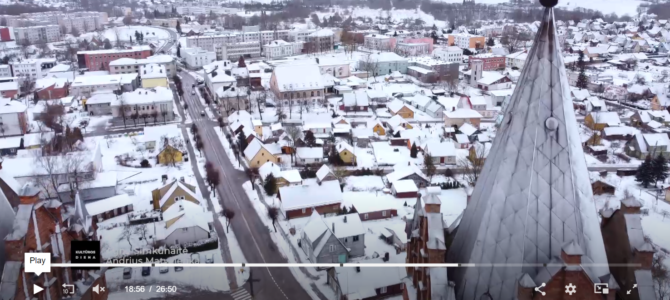
Legacy of Jewish Community Being Revived in Kupiškis
The surviving material culture of the former Kupiškis Jewish community, namely a mill which changed communal life once upon a time, is being restored in the small town in northeast Lithuania. For more, see here.
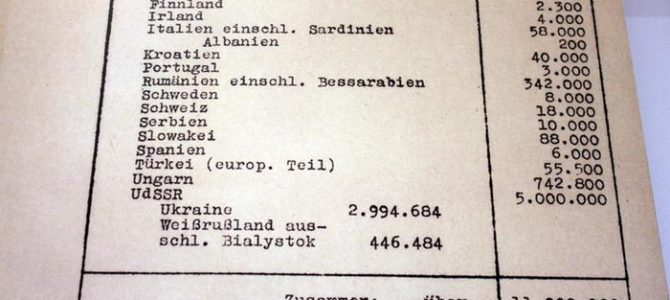
Wannsee Conference: The Nazi Regime’s Blueprint for the Holocaust
On January 20, 1942, details about the extermination of Europe’s Jews were discussed. Even 80 years later, the minutes of the Wannsee Conference send chills down the spine.
In March of 1947 as officials from the German Foreign Ministry tried to justify their actions at the Nuremberg Trials, Robert Kempner made a coincidental discovery. Amid the masses of documents left behind by the Nazis, a cover page piqued the curiosity of the assistant US chief counsel. A stamp in red ink is clearly legible on the page: “Secret Reich Matter.”
Under the nondescript title “Minutes of Meeting,” 15 pages serve as evidence of the systematic execution of European Jews. It is a record of the Wannsee Conference, which took place on January 20, 1942. It is the 16th set of minutes–the only one remaining of a set of 30.
At noon on that day, 15 men who had accepted an invitation from Reinhard Heydrich, head of the dreaded Reich Main Security Office, arrived to a lavish villa in the posh Berlin suburb of Wannsee. The temperature outside was -12 degrees Celsius (10 F), and the frigidness behind what was discussed within the walls of that villa still sends chills down one’s spine today.
Full story here.
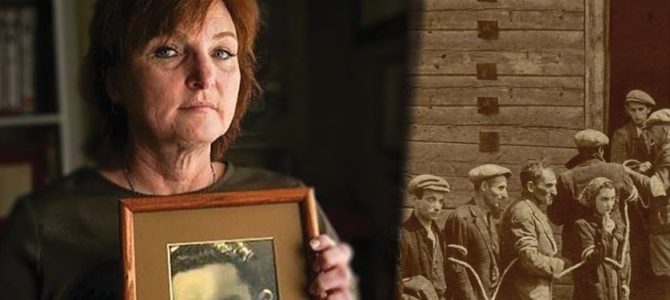
Silvia Foti to Launch Lithuanian Translation of Biography of Her Grandfather
A report on the Lithuanian news site 15min.lt says Silvia Foti will speak at the Vilnius Book Fair to be held from February 24 to 27 this year. Foti will launch the Lithuanian translation of her book about her grandfather, Lithuanian Nazi war criminal Jonas Noreika.
Full story in Lithuanian here.
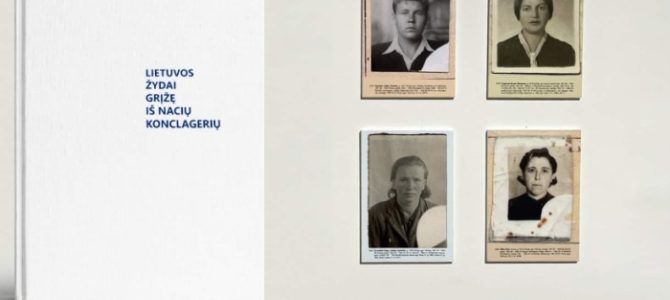
Litvaks Who Came Back
The Martynas Mažvydas National Library and its Judaica Center will open an exhibit of photographs, present a book about and hold a discussion on Lithuanian Jews who came back to Lithuania from concentration camps on at 6:00 P.M. January 26. The event will be hosted by director of the Judaica Center Lara Lempertienė and the discussion panel will include several Lithuanian historians and academicians. The discussion will be held in Lithuanian.
“The main target of my searches was people’s faces,” Kęstutis Grigaliūnas, author of the book “Lietuvos žydai, grįžę iš nacių konclagerių” [Lithuanian Jews Who Returned from Nazi Concentration Camps] which will be presented, said in a press release on the library’s facebook page.
The library said the event is closed to people without proof of vaccination and that all faces must be covered by “at least an FFP2-level respirator,” except for people who are unable to cover their faces with such masks due to medical conditions, who must wear plexiglass face shields instead. The library also said attendees must use hand disinfectant and maintain physical distance at the event, and that registration is required.

Who Turned Anne Frank In? New Book Takes Fresh Look
The story of Anne Frank has captivated millions of readers, but no one knows how the Franks hidden in an Amsterdam annex were discovered in 1944. A team of cold-case researchers has just published a new theory of who might have done it and why.
A cold case team that combed through evidence for five years in a bid to unravel one of World War II’s enduring mysteries has reached what it calls the “most likely scenario” of who betrayed Jewish teenage diarist Anne Frank and her family.
Their answer, outlined in a new book called “The Betrayal of Anne Frank: A Cold Case Investigation” by Canadian academic and author Rosemary Sullivan, is that it could have been a prominent Jewish notary called Arnold van den Bergh, who disclosed the secret annex hiding place of the Frank family to German occupiers to save his own family from deportation and murder in Nazi concentration camps.
Silvia Foti Book on Grandfather to be Launched at Vilnius Book Fair
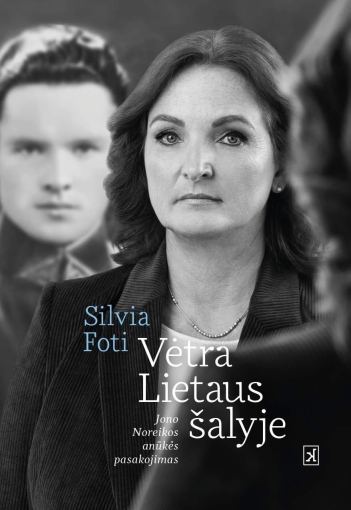
Lithuanian publisher Kitos Knygos has announced the impending launch of SIlvia Foti’s book about her grandfather Jonas Noreika in Lithuanian under the title “Vėtra Lietaus šalyje” [Storm in the Rain Country].
“Journalist Silvija Kučėnaitė-Foti (born 1961) grew up in Chicago’s Lithuanian community hearing about her grandfather’s achievements fighting for Lithuania’s freedom. He was initiator of the June Uprising, imprisoned at the Stutthof camp by the Nazis and killed by the KGB when he returned to Lithuania,” Kitos Knygos wrote on their facebook page.
“Before she died, her mother asked Silvia to complete her mission, to commemorate General Storm in a book. Silvia agreed. Later when she was travelling in Lithuania she discovered people who believed Noreika as head of the Šiauliai district during the Nazi occupation perpetrated Holocaust crimes. Silvia, who considered her grandfather an important hero of the Lithuanian nation, found this incredible: could her family really have hidden from her salient facts in Noreika’s biography?
“In this literary memoir the author presents her 20-year-long investigation of her grandfather’s actions in 1941. This is the story of the author’s own difficult road to learning the truth about her family. Foti relies upon Noreika’s correspondence, orders signed by him, documents issued by the Lithuanian Activists Front and KGB and other documents. The book includes compelling portraits and recollections from Noreika’s fellow travellers.
“This will be an authorized and checked edition. Martas Geležauskas translated from English, Darius Pocevičius translated Russian-language KGB documents and Asta Bučienė and Aira Naiuronytė edited the text. Kazimieras Dainovskis did design.”
Lithuanian publisher’s facebook page here.

YIVO Vilna Collection Online
Dear Faina,
Today, I am delighted to announce that The YIVO Institute for Jewish Research (YIVO) completed the Edward Blank YIVO Vilna Online Collections Project (EBYVOC), a historic 7-year, $7 million international initiative to process, conserve and digitize YIVO’s divided prewar library and archival collections.
These materials, divided by World War II and located in New York and Vilnius, Lithuania, have now been digitally reunited for the first time.
Comprising approximately 4.1 million pages of archival documents and books, the EBYVOC Project is an international partnership between YIVO, the Lithuanian Central State Archives, the Martynas Mavydas National Library of Lithuania, and the Wroblewski Library of the Lithuanian Academy of Sciences.
The completion of the EBYVOC Project is an epic milestone in the preservation of Eastern European Jewish history and culture. It was completed on schedule and within budget, providing a global audience access to these treasures through a dedicated web portal free-of-charge. We invite you to explore this remarkable collection at https://vilnacollections.yivo.org/.
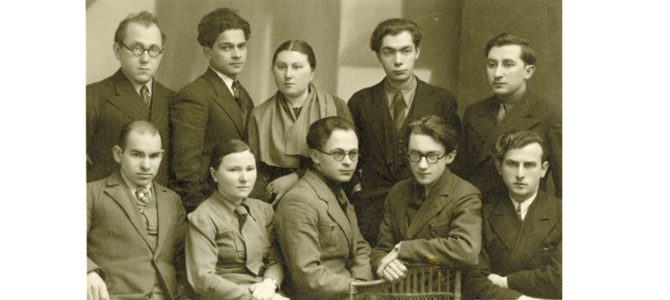
Chaim Grade: Facts of a Life
Photo: Jung-Vilne literary group: Chaim Grade is standing in the top row to the left, the poets Shmerke Kaczerginski and Abraham Sutzkever are seated in the middle. YIVO archives
by Susanne Klingenstein and Yehudah DovBer Zirkind, In Geveb, December 15, 2021
INTRODUCTION
When on May 2, 2010, Inna Hecker Grade passed away at the age of eighty-five, a sigh of relief, unkind and hard-edged, coursed through some corners of the Yiddish literary world and a small circle of scholars and archivists tensed with expectation. For twenty-eight years, since the passing of her husband Chaim Grade on June 26, 1982, the literary legacy of one the most important Yiddish prose-stylists and documentary storytellers to emerge from the ashes of Vilna, had lain concealed in the couple’s Bronx apartment, guarded by his angry widow who deemed the world unworthy of her husband’s genius. After a brief foray into the publishing world, she had withdrawn into a tomb filled with her husband’s treasures.
The sepulchral metaphor was first used by Ralph Speken, the psychiatrist who had taken care of Inna Grade during the last months of her life. On the eve of breaking the seal, Speken pleaded: “They should take over that apartment as if they were taking over King Tut’s tomb.” Scholars and readers expected the discovery of manuscripts in drawers and closets that would speedily be published, perhaps in critical editions, and bring Grade back to literary life. No new work, no critical edition or biography has yet appeared.
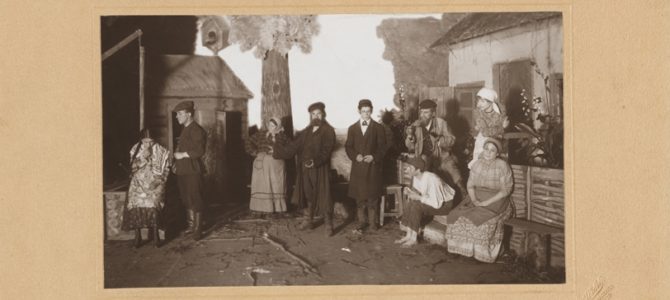
Remembering Documentary Photographer, Author, Screenwriter Alter-Sholem Kacyzne
Photo: Alter Kacyzne. “Green Fields” theater still. ca. 1921. Museum of the City of New York.
text by Yitskhok Niborski, translated from Yiddish by Yankl Salant
Kacyzne, Alter-Sholem (May 31, 1885-July 7, 1941)
(1885–1941), Yiddish writer and critic; photographer. Born in Vilna to a working-class family, Alter-Sholem Kacyzne (Yid., Katsizne) attended heder and also a Russian-language Jewish elementary school. At 14, after his father’s death, he stopped his formal studies. Kacyzne was an autodidact and remained an avid reader not only of literature in Russian, Yiddish, and Hebrew, but also of Polish, German and French works. For about 11 years he lived in Ekaterinoslav where he learned to be a photographer and was married.
In 1909, Kacyzne first published two Russian stories in the periodical Evreiski mir (Jewish World), edited by S. An-ski. In 1910, attracted by the work and reputation of Y. L. Peretz, Kacyzne settled in Warsaw, where he opened a photography studio. He grew very close to Peretz, who became a literary mentor, but did not begin publishing in Yiddish until after Peretz’s death in 1915. Kacyzne’s first Yiddish texts appeared in collections in Vilna and Kiev. In 1919 and 1920 his first two books were published in Warsaw, the dramatic poems Der gayst der meylekh (The Spirit, the King) and Prometeus (Prometheus). He was also a consistent contributor to (and sometimes co-founder and co-editor of) a series of literary periodicals, most of them short-lived, in Warsaw and Vilna, in which he published novellas and stories that in 1922 appeared in book form as Arabeskn (Arabesques).
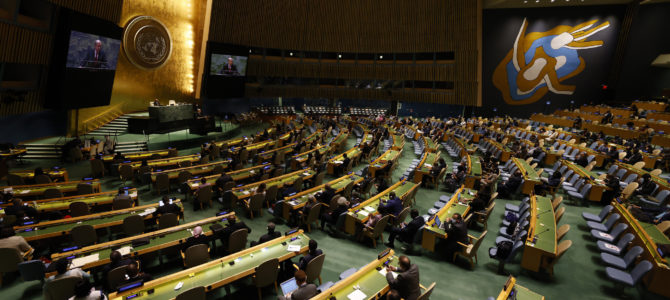
Israel Advancing UN General Assembly Resolution Aimed at Combating Holocaust Denial
Times of Israel
Envoy confident measure will pass overwhelmingly later this month; it won’t have enforcement mechanism, but Erdan says effects of new international standard will be significant
Israel will bring a resolution aimed at combating Holocaust denial for a vote before the United Nations General Assembly later this month, Ambassador Gilad Erdan announced on Wednesday.
The resolution will provide a specific classification for Holocaust denial, using the working definition put together by the International Holocaust Remembrance Alliance. It will provide actions expected of signatory countries in order to address the phenomenon, and will demand social media networks remove posts that fall under the IHRA definition, Erdan said in a briefing with reporters.

